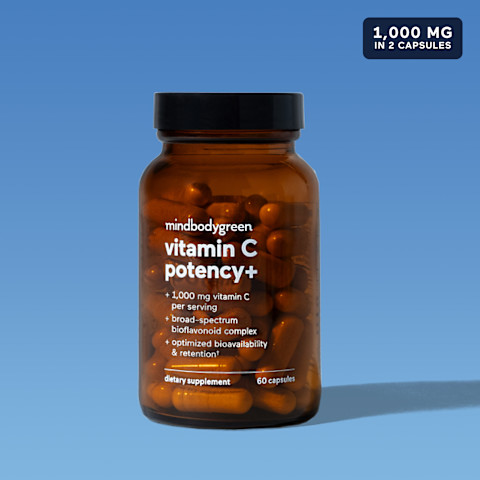
While vitamin C insufficiency is a prevalent problem that affects 46% of the U.S. adult population1 (yes, almost half of American adults), people over 60 are even more likely to have suboptimal vitamin C levels2. In fact, a meta-analysis published in the International Journal for Vitamin and Nutrition Research found that adults between the ages of 60 and 96 had significantly lower vitamin C plasma levels3 when compared to younger individuals (i.e., aged 15 to 65) following the same intake of vitamin C.
Considering sufficient vitamin C levels are vital for optimizing immune health, cognitive function, and overall longevity, this age-related health challenge is concerning, to say the least.*
Why our vitamin C status changes as we age.
While the science shows that older adults have lower vitamin C levels, the exact cause of this unfortunate phenomenon is not completely clear.
One theory is that our need for antioxidant activity increases with age due to higher levels of oxidative stress. Vitamin C is a dynamic and eager scavenger of free radicals that increases antioxidant activity in the body not only by combating reactive oxidative species (ROS) on its own but by regenerating other antioxidant powerhouses (e.g., glutathione and vitamin E) as well.* Like vitamin C, our body stores of "master antioxidant" glutathione also decrease with age. This decrease in antioxidant activity levels means there's a greater need for antioxidants to combat ROS.
While it's important for people of all ages to be cognizant of vitamin C levels, increasing vitamin C intake through diet and quality supplementation can both restore glutathione and maintain healthy overall antioxidant levels, which is especially beneficial for older adults.* And these vitamin-C-optimizing practices should ideally be a daily consideration (and endeavor).
Another theory is that vitamin C absorption is less efficient in our later years (although it's not always efficient for younger people either). Taking a bioavailable vitamin C supplement known to affect cellular vitamin C actions can ensure you're both absorbing, retaining, and fully leveraging the essential vitamin so it can support brain and whole-body longevity (among other incredible health benefits).*
How to promote healthy vitamin C levels throughout life.
For a targeted approach that addresses the major obstacles for age-related insufficient vitamin C levels (i.e., absorption and antioxidant turnover rate), consider taking a premium vitamin C supplement with bioavailable vitamin C that's been clinically shown to increase plasma vitamin C levels and overall antioxidant activity as evidenced by key biomarkers.* (Hint: mbg's vitamin C potency+ fits the bill.)
vitamin C potency+ contains a full-potency dose (1,000 milligrams) of a unique vitamin-C-lipid-citrus bioflavonoid trio called PureWay-C™ that demonstrates superior absorption (i.e., a 233% higher cellular absorption rate4 than ascorbic acid on its own) and free-radical-scavenging abilities (i.e., it's 11% more effective4 at fighting ROS than other forms of vitamin C).*†
While high-quality supplementation with superior bioavailability and bioefficacy is the most effective way to ensure healthy vitamin C levels every day, eating vitamin-C-rich foods—such as guavas, sweet red peppers, kiwi, and oranges—can also help ensure you're getting enough of the potent antioxidant (plus other awesome nutrients and phytonutrients, too).* We recommend combining both strategies.
The takeaway.
Vitamin C is critical for keeping your brain, heart, skin, and immune system healthy.* However, maintaining sufficient vitamin C levels can be more challenging than you'd think—especially later in life.
If you're over 60 (or any age, for that matter), taking a daily vitamin C supplement with optimized bioavailability and efficacy like mbg's vitamin C potency+ can ensure you're getting all the C you need to combat oxidative stress, bolster glutathione levels, and more to support healthy aging.*
† PureWay-C™ research has demonstrated superior cellular uptake & retention rates, serum response, and bioactivity compared to other forms of vitamin C (e.g., ascorbic acid, calcium ascorbate, Ester-C).


